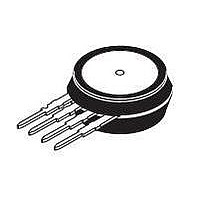MPX12D Freescale Semiconductor, MPX12D Datasheet - Page 5

MPX12D
Manufacturer Part Number
MPX12D
Description
SENSOR DIFF PRESS 1.45PSI MAX
Manufacturer
Freescale Semiconductor
Series
MPX12r
Type
Differentialr
Datasheet
1.MPX12DP.pdf
(20 pages)
Specifications of MPX12D
Pressure Type
Differential
Operating Pressure
1.45 PSI
Port Size
Female, 0.136" (3.4544mm)
Output
0 ~ 55mV
Voltage - Supply
3V
Termination Style
PCB
Operating Temperature
-40°C ~ 125°C
Package / Case
4-SIP, Axial Port
Pressure Range
0 to 10KPa
Overload Pressure (max)
75KPa
Mounting
Through Hole
Pin Count
4
Operating Temp Range
-40C to 125C
Operating Temperature Classification
Automotive
Package Type
Case 344-15
Operating Supply Voltage (typ)
3V
Operating Supply Voltage (max)
6V
Mounting Style
Through Hole
Maximum Operating Temperature
+ 125 C
Minimum Operating Temperature
- 40 C
Operating Supply Voltage
3 V
Lead Free Status / RoHS Status
Lead free / RoHS Compliant
Available stocks
Company
Part Number
Manufacturer
Quantity
Price
Company:
Part Number:
MPX12D
Manufacturer:
FREESCALE
Quantity:
2 000
Part Number:
MPX12D
Manufacturer:
FREESCALE
Quantity:
20 000
Part Number:
MPX12DP
Manufacturer:
FREESCALE
Quantity:
20 000
Sensors
Freescale Semiconductor
Temperature Compensation
MPX12 series over temperature.
diaphragm, there are no temperature effects due to
differences in the thermal expansion of the strain gauge and
the diaphragm, as are often encountered in bonded strain
gauge pressure sensors. However, the properties of the
strain gauge itself are temperature dependent, requiring that
the device be temperature compensated if it is to be used
over an extensive temperature range.
achieved rather simply with additional resistive components, or
by designing your system using the MPX2010D series sensor.
compensation over both –40 to +125°C and 0 to +80°C
ranges are presented in Applications Note AN840.
Figure 2
Because this strain gauge is an integral part of the silicon
Temperature compensation and offset calibration can be
Several approaches to external temperature
shows the typical output characteristics of the
PSI
kPa
80
70
60
50
40
30
20
10
0
0
Figure 3. Linearity Specification Comparison
80
70
60
50
40
30
20
10
0
V
Figure 2. Output vs. Pressure Differential
S
0
P1 > P2
= 3 V
2.0
0.3
DC
Actual
Pressure Differential
4.0
0.6
-40°C
Pressure (kPa)
Linearity
Theoretical
6.0
0.9
the equation: V
pressure range
calculating nonlinearity: (1) end point straight line fit or (2) a
least squares best line fit. While a least squares fit gives the
“best case” linearity error (lower numerical value), the
calculations required are burdensome.
(often more desirable in error budget calculations) and the
calculations are more straightforward for the user.
Freescale’s specified pressure sensor linearities are based
on the end point straight line method measured at the
midrange pressure.
+25°C
Linearity refers to how well a transducer's output follows
Conversely, an end point fit will give the “worst case” error
8.0
+125°C
1.2
Max
OUT
(Figure
(V
(V
Offset
Span
10
OFF
= V
FSS
1.5
P
)
)
OFF
OP
3). There are two basic methods for
Range
Offset
Span
(Typ)
(Typ)
LINEARITY
+ sensitivity x P over the operating
Pressure
MPX12
5













